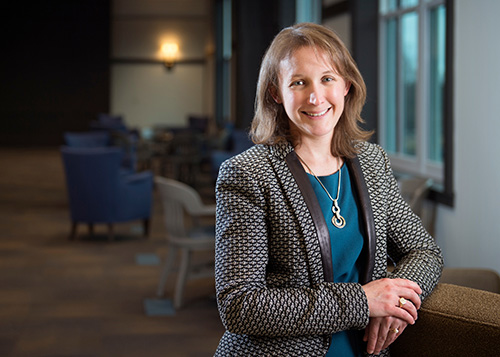Osman takes helm of MSU’s Institute for the Humanities
Contact: Sarah Nicholas

STARKVILLE, Miss.—In her new role as director of Mississippi State’s Institute for the Humanities, Associate Professor Julia Osman is inspiring the university community to consider different perspectives in a broader global context.
A faculty member since 2011, Osman accepted the director position in January after William Anthony Hay completed his successful term. He continues his full-time work as an associate professor in MSU’s Department of History.
Serving the departments of art, communication, English, classical and modern languages and literatures, history, music, and philosophy and religion, as well as the Cobb Institute of Archaeology, the Institute for the Humanities is a unit of the College of Arts and Sciences. The college regularly sponsors activities that bring prominent humanities scholars to the university.
The institute supports faculty research initiatives and public outreach through scholarship and innovative teaching, and serves as a liaison between its members and the Office of Research and Economic Development.
“The institute aims to help students learn to appreciate aspects of life, such as art, music, literature and poetry, that they can enjoy and use to express themselves for the rest of their lives, regardless of where and how they live,” said Osman, who holds a doctorate in early-modern French history and master’s in European history from the University of North Carolina at Chapel Hill.
Also a College of William and Mary history bachelor’s graduate, Osman said the institute strives to help people understand the purpose of the humanities.
“Whether we acknowledge it or not, the humanities inform everything,” she emphasized. “The questions we ask, be it of the natural world, the cosmos, or what makes people tick, are all informed by the political, social and cultural contexts.”
Osman’s current research project involves an examination of the transformation of civil-military relations from the 17th through 18th centuries. As institute director, she wants to put MSU students and community members “in touch with a variety of different ways of looking at the world.”
“Empathy, critical thinking and a variety of means of communicating and listening—all of these things help us to live fuller lives and behave as responsible citizens,” Osman said. “We need to cultivate our knowledge and experience of the humanities to best exercise our freedoms and make the most of our human potential.”
MSU College of Arts and Sciences Dean Rick Travis said Osman will be instrumental in advancing the institute’s mission “to promote a deeper appreciation for the humanities disciplines through a variety of speakers and programs, along with the research and creative activities it sponsors.”
“I think that Dr. Osman has some wonderful ideas for promoting more cross-disciplinary research efforts that will enable us to capitalize on the unique strengths and opportunities for the study of humanities in one of the most culturally fertile, creative states in the nation,” Travis said.
By providing venues for researchers in the humanities to share their projects with fellow scholars, Osman said the institute will continue to foster knowledge in those areas.
“We want to involve the community by inviting them to partake in campus events and meet our visiting speakers, as well as interact with our faculty and see what humanities researchers are looking at now and why those topics matter to the wider world,” she explained.
More information on the College of Arts and Sciences and its Institute for the Humanities is available at www.cas.msstate.edu or www.ih.msstate.edu.
MSU is Mississippi’s leading university, available online at www.msstate.edu.